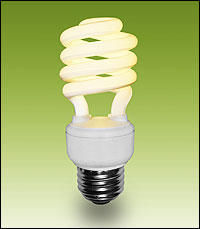 The Environmental Protection Agency and some large business (especially GE who makes the bulbs and owns NBC and MSNBC), including Wal-Mart, are aggressively promoting the sale of compact fluorescent light bulbs as a way to save energy and fight global warming. They want Americans to buy many millions of them over the coming years.
The Environmental Protection Agency and some large business (especially GE who makes the bulbs and owns NBC and MSNBC), including Wal-Mart, are aggressively promoting the sale of compact fluorescent light bulbs as a way to save energy and fight global warming. They want Americans to buy many millions of them over the coming years.But the bulbs contain mercury, a neurotoxin, and the companies and federal government haven't come up with effective ways to get Americans to recycle them!
"The problem with the bulbs is that they'll break before they get to the landfill. They'll break in containers, or they'll break in a dumpster or they'll break in the trucks. Workers may be exposed to very high levels of mercury when that happens," says John Skinner, executive director of the Solid Waste Association of North America, the trade group for the people who handle trash and recycling.
Skinner says when bulbs break near homes, they can contaminate the soil.
Mercury is a potent neurotoxin, and it's especially dangerous for children and fetuses. Most exposure to mercury comes from eating fish contaminated with mercury, however, that can change now that we're adding more and more mercury filled bulbs into our homes and places of business.
Some states, cities and counties have outlawed putting CFL bulbs in the trash, but in most states the practice is legal.
Pete Keller works for Eco Lights Northwest, the only company in Washington state that recycles fluorescent lamps. He says it is illegal to put the bulbs in the trash in some counties in Washington, but most people still throw them out.
"I think most people do want to recycle, but if it's not made easy, it doesn't happen," Keller says. "And they're small enough to fit in a trash can. So by nature, I think most people are not recyclers. So if it's small enough to fit in a trash can, that's where it ends up."
Experts agree that it's not easy for most people to recycle these bulbs. Even cities that have curbside recycling won't take the bulbs. So people have to take them to a hazardous-waste collection day or a special facility.
The head of the Environmental Protection Agency program concedes that not enough has been done to urge people to recycle CFL bulbs and make it easier for them to do so.
"I share your frustration that there isn't a national infrastructure for the proper recycling of this product," says Wendy Reed, who manages EPA's Energy Star program. That programs gives the compact bulbs its "energy star" seal of approval.
She says that even though fluorescent bulbs contain mercury, using them contributes less mercury to the environment than using regular incandescent bulbs. That's because they use less electricity — and coal-fired power plants are the biggest source of mercury emissions in the air.
The difference however is that while Mercury emissions at Coal Fired plants can be controlled with tougher legislation, Mercury in our homes and offices, and especially landfills cannot be easily contained.
Reed says the agency has been urging stores that sell the bulbs to help recycle them.
"EPA is actively engaged with trying to find a solution that works for these retailers around recycling the product, because it's really, really important," Reed says.
But so far, she says the biggest sellers of the bulbs haven't stepped up to the plate.
"The only retailer that I know of that is recycling is IKEA," she says, referring to the Swedish-owned furniture chain store.
Reed says the EPA has been prodding other retailers, such as Wal-Mart, to do more.
"We are working with Wal-Mart on it, we are making some progress. But no commitments have been made on the part of Wal-Mart," she says.
Wal-Mart didn't respond to requests for a comment on the issue.
EPA also has asked retailers to sell the lower mercury compact bulbs that some manufacturers are making. Engineers say you can't cut mercury out completely.
Some other big companies have started paying attention to the recycling problem.
General Electric has been making compact fluorescents for 20 years. Now the company admits that the little bit of mercury in each bulbs could become a real problem if sales balloon as expected.
"Given what we anticipate to be the significant increase in the use of these products, we are now beginning to look at, and shortly we'll be discussing with legislators, possibly a national solution here," says Earl Jones, a senior counsel for General Electric.
In fact, Jones said he was having his first talks with congressional staffers on Thursday.
Story originally by Elizabeth Shogren